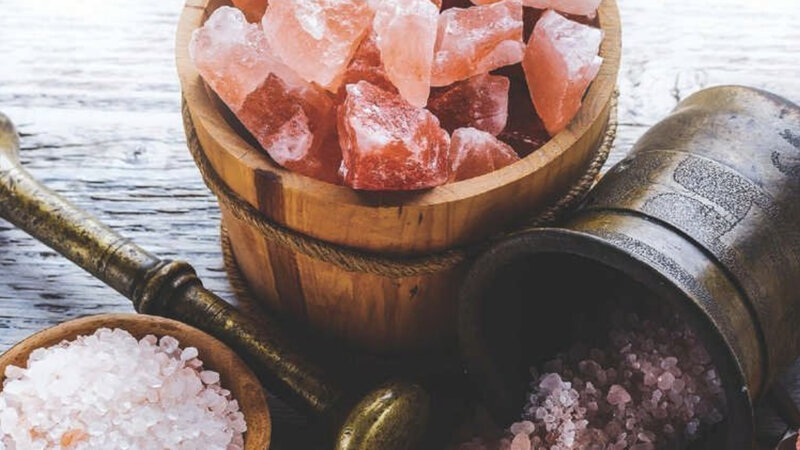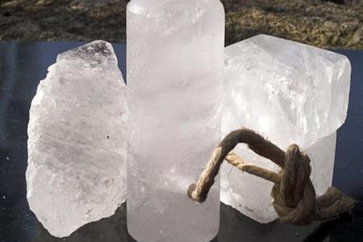Kala Namak (Black Salt): Health Benefits, Uses And Side Effects
Black salt, also known as “kala namak” in South Asia, is a unique type of salt widely used in Indian and Pakistani cuisines, as well as in Ayurvedic medicine and beauty treatments. Despite its name, black salt appears as a grayish-pink powder when ground. 
It is derived from natural sources, such as volcanic rock salt or sea salt, which undergo a special heating and cooling process that imparts its distinct color and flavor. kala namak is known for its pungent, sulfurous aroma and tangy taste, which is attributed to its high sulfur content.
It contains various minerals and compounds, including sodium chloride, sodium sulfate, iron, and traces of other minerals. This combination of elements gives black salt a unique flavor profile, often described as slightly eggy or reminiscent of boiled eggs.
In culinary applications, black salt is primarily used as a seasoning agent, adding a savory and umami taste to dishes. It is particularly popular for enhancing the flavors of salads, chaats (Indian street food snacks), pickles, chutneys, and fruit salads. Its distinct flavor also makes it a key ingredient in vegan and vegetarian recipes as a substitute for the taste of eggs.
In Ayurvedic medicine, kala namak is believed to possess medicinal properties and is used to address various health concerns. It is commonly employed in the treatment of digestive issues, such as bloating, indigestion, and acidity. Additionally, black salt is used in Ayurveda to alleviate joint pain, improve digestion, boost metabolism, and balance electrolyte levels in the body.
Beyond culinary and medicinal applications, black salt is also utilized in beauty treatments. In particular, it is used in spa therapies and hair care routines in some Oriental cultures. Its mineral content is believed to offer benefits for skin health, detoxification, and hair nourishment.
Overall, kala namak is a versatile and distinctive ingredient that adds a unique flavor to a wide range of dishes while also being associated with various health and beauty benefits in traditional practices.
Types of black salt: differences and composition
There are several types of black salt, each with its own distinct characteristics and composition. The most commonly known types include:
1. Kala Namak (Indian Black Salt)
Kala Namak is a highly prized black salt in Indian cuisine. It is derived from natural salt deposits and is known for its strong sulfuric aroma and unique tangy flavor. Kala Namak is rich in sulfur compounds, which give it its characteristic taste and odor. It contains sodium chloride, iron, trace minerals, and a significant amount of sulfur compounds, such as hydrogen sulfide.
2. Himalayan Black Salt
Himalayan black salt, also known as “Kala Namak” or “Sanchal,” is sourced from the Himalayan region. It is a pinkish-gray-colored salt with a distinct sulfurous aroma. Himalayan black salt is formed through a unique geological process and contains various minerals like sodium, potassium, magnesium, iron, and trace elements. It also contains sulfur compounds, giving it a distinctive flavor.
3. Hawaiian Black Salt
Also known as “Black Lava Salt,” Hawaiian black salt is a sea salt that obtains its black color from activated charcoal. It is harvested from the volcanic islands of Hawaii and is a blend of sea salt and activated charcoal, which gives it a striking black color. Hawaiian black salt has a slightly smoky flavor and is used as a finishing salt or in spice blends.
4. Black Salt from Cyprus
This black salt is made by blending traditional sea salt with activated charcoal. It originates from the Mediterranean island of Cyprus and has a striking black color. The addition of activated charcoal gives it a unique appearance and mild flavor.
Note: It’s important to note that the composition and flavor of black salts may vary slightly depending on their source and processing methods.
However, they all share a common characteristic of having a distinctive color and flavor profile, often described as sulfurous or eggy, which adds a unique touch to culinary dishes.
Nutritional Value Of Black Salt
kala namak or sao called Black salt, like any other type of salt, is primarily composed of sodium chloride. It also contains trace amounts of other minerals and compounds that contribute to its unique flavor and color.
However, the nutritional value of kala namak is relatively similar to regular table salt. Here’s a breakdown of the approximate nutritional composition of black salt per 100 grams:
- Calories: 0 (Salt is calorie-free as it provides no significant energy.)
- Sodium: Approximately 37,500 mg (sodium content can vary depending on the specific type and brand of black salt).
- Potassium: Trace amounts (may vary depending on the source and processing method).
- Magnesium: Trace amounts (may vary depending on the source and processing method).
- Iron: Trace amounts (typically present in small quantities due to the presence of iron sulfide compounds).
It’s important to note that the nutritional value of black salt is primarily determined by its sodium content. Excessive sodium intake can contribute to health issues such as high blood pressure, heart disease, and fluid retention. Therefore, it’s essential to consume black salt in moderation as part of a well-balanced diet and consider your overall sodium intake from all sources.
If you have specific dietary concerns or health conditions, it’s recommended to consult with a healthcare professional or registered dietitian for personalized advice regarding salt intake and dietary choices.
What Is Black Salt Useful For Medicinal Properties
Black salt, particularly Kala Namak, is believed to possess several medicinal properties according to Ayurvedic tradition. Although scientific evidence supporting these claims is limited, it is widely used in traditional medicine for various purposes. Some of the purported medicinal benefits of black salt include:
1. Digestive Aid
kala namak is commonly used to improve digestion and alleviate digestive issues such as bloating, indigestion, and constipation. It is believed to stimulate the secretion of digestive enzymes, thereby promoting better digestion.
2. Alleviating Acidity
Black salt is often used as a natural remedy for hyperacidity or acid reflux. It is believed to help balance the acid levels in the stomach and provide relief from symptoms such as heartburn.
3. Joint Health
Black salt is sometimes used in Ayurvedic treatments for joint-related problems. It is believed to have a soothing effect on joint inflammation and may help reduce pain and discomfort.
4. Respiratory Health
In Ayurveda, black salt is believed to be beneficial for respiratory ailments like asthma and bronchitis. It is used in certain herbal formulations to help relieve congestion and facilitate easier breathing.
5. Electrolyte Balance
Black salt contains essential minerals like sodium, potassium, and magnesium, which are important for maintaining electrolyte balance in the body. It is believed to help replenish electrolytes and maintain proper hydration levels.
6. Skin Health
Some traditional beauty practices utilize black salt for its potential skin benefits. It is believed to have detoxifying properties, helping to remove impurities and promote clearer skin. It is also used in exfoliating scrubs and as a natural ingredient in facial masks.
7. Anti-inflammatory Effects
Black salt is believed to possess anti-inflammatory properties, which may help reduce inflammation in the body. This property is often attributed to its sulfur content, which has been suggested to have anti-inflammatory effects.
8. Digestive Disorders
Black salt is used in Ayurveda to alleviate various digestive disorders, including flatulence, bloating, and abdominal pain. It is believed to help balance digestive fire (agni) and promote healthy digestion.
9. Respiratory Health
In traditional medicine, black salt is sometimes used to address respiratory conditions such as cough, cold, and sinus congestion. It is believed to have expectorant properties, helping to clear mucus and relieve respiratory discomfort.
10. Detoxification
Black salt is considered to have detoxifying effects on the body. It is believed to help eliminate toxins, support liver function, and promote overall detoxification processes.
11. Oral Health
Black salt is occasionally used in Ayurvedic oral care practices. It is believed to have antibacterial properties and may be used as a natural mouthwash or gargle to promote oral hygiene and freshen breath.
12. Nutrient Absorption
Black salt is sometimes used in Ayurveda to enhance nutrient absorption in the body. It is believed to improve the bioavailability of certain nutrients and aid in their assimilation.
13. Blood Pressure Regulation
Some traditional practices suggest that black salt may help regulate blood pressure levels. It is believed to have a balancing effect on blood pressure, although it is important to note that individual responses may vary.
Note: While black salt has been used traditionally for these purposes, it is important to approach its usage with caution and consult a healthcare professional for personalized advice.
Scientific research on the specific medicinal properties of black salt is limited, and individual experiences may vary.
Black salt Application in Indian cooking
Black salt, with its distinct flavor profile, is a versatile ingredient used in various culinary applications, particularly in Indian and Pakistani cuisines. Here are some common ways black salt is used in cooking:
1. Seasoning
Black salt is commonly used as a seasoning agent in numerous dishes. Its unique tangy and slightly sulfurous flavor adds depth and complexity to a variety of foods. It is often sprinkled as a finishing touch on salads, fruits, and chaats (Indian street food snacks) to enhance their taste.
2. Chutneys and Pickles
Black salt is a key ingredient in many chutneys and pickles. It provides a distinct savory and tangy flavor that complements the other ingredients. It is often used in mango chutney, mint chutney, and pickles to add a unique twist.
3. Chaat Masala
Black salt is a vital component of chaat masala, a popular spice blend used in Indian street food. Chaat masala is sprinkled over snacks like bhel puri, papdi chaat, and pani puri to impart a tangy and savory flavor.
4. Vegan and Vegetarian Dishes
Black salt is highly valued in vegan and vegetarian cooking as it can provide an egg-like flavor. It is often used in tofu scrambles, vegan omelets, and plant-based egg substitutes to mimic the taste of eggs.
5. Raita and Yogurt-based Dishes
Black salt is commonly added to raita, a yogurt-based side dish. It lends a unique tanginess to the raita and complements the other spices and ingredients. It can also be used in yogurt-based marinades and dressings.
6. Ayurvedic Drinks
In Ayurveda, black salt is occasionally used in beverages like buttermilk (chaas) and herbal concoctions. It is believed to aid digestion and provide a refreshing taste.
Note: It’s important to note that black salt is potent, and a little goes a long way. It’s recommended to use it sparingly and adjust the quantity based on personal preference.
Additionally, it is advisable to store black salt in airtight containers away from moisture to preserve its flavor and aroma.
Side Effects And Contraindications Of Black Salt
Black salt, when consumed in moderation as part of a balanced diet, is generally considered safe for most people. However, it’s important to be aware of potential side effects and contraindications, especially for individuals with certain health conditions or dietary restrictions. Here are some important considerations:
1. Sodium Intake: Black salt, like any other salt, contains sodium. Excessive sodium intake can contribute to high blood pressure and other health issues. Individuals with hypertension or other cardiovascular conditions should monitor their sodium intake and consult with their healthcare provider regarding their specific dietary needs.
2. Iodine Deficiency: Unlike iodized table salt, black salt is typically not iodized. Iodine is essential for thyroid function and overall health. Individuals who rely solely on black salt for their sodium intake may be at risk of iodine deficiency. It’s important to ensure an adequate iodine intake through other dietary sources or by using iodized salt if needed.
3. Sulfur Sensitivity: Black salt has a distinct sulfurous aroma and taste due to its sulfur content. Individuals with sulfur sensitivities or allergies may experience adverse reactions, such as digestive discomfort or skin reactions, when consuming black salt. It is advisable for individuals with known sulfur allergies to avoid black salt or consult with a healthcare professional before using it.
4. Kidney Conditions: Individuals with kidney disease or impaired kidney function may need to limit their salt intake, including black salt. Excessive sodium intake can strain the kidneys and worsen kidney-related health conditions. It is important to follow the dietary recommendations provided by a healthcare professional for managing kidney health.
5. Dietary Considerations: Black salt should be consumed in moderation as part of a well-balanced diet. Excessive consumption of any type of salt can contribute to fluid retention, bloating, and other digestive discomforts. It is important to maintain a balanced sodium intake and consider the overall sodium content from all dietary sources.
As with any dietary ingredient, it is recommended to consult with a healthcare professional or registered dietitian before making significant changes to your diet, especially if you have any underlying health conditions or specific dietary restrictions.
How To Choose And Store Black Salt?
When it comes to choosing and storing black salt, here are some considerations:
Choosing Black Salt:
1. Quality: Opt for high-quality black salt from reputable sources. Look for brands or suppliers known for their quality products and good manufacturing practices.
2. Type: There are different types of black salt available, such as Kala Namak, Himalayan black salt, and Hawaiian black salt. Consider the specific flavor profile and characteristics you desire for your culinary needs.
3. Authenticity: If you’re looking for a specific type of black salt, ensure that it is sourced and produced authentically. For example, Kala Namak should ideally come from India or Pakistan, and Himalayan black salt should originate from the Himalayan region.
Storing Black Salt:
1. Container: Store black salt in an airtight container to protect it from moisture and prevent clumping. Choose a container with a tight-fitting lid that keeps air and humidity out.
2. Dry and Cool Location: Keep the container of black salt in a cool, dry place away from direct sunlight. Exposure to heat and light can affect the quality and flavor of the salt.
3. Avoid Contamination: Prevent cross-contamination by using a clean, dry spoon or scoop when handling the salt. This will help maintain the integrity of the black salt and prevent moisture from entering the container.
4. Shelf Life: Black salt generally has a long shelf life due to its low moisture content. However, it’s best to check the packaging or consult the manufacturer’s instructions for any specific storage guidelines or expiration dates.
5. Check for Clumping: Periodically check the salt for any signs of clumping or moisture. If the kala namak becomes clumpy, you can break it apart with a fork or process it in a grinder to restore its texture.
By following these guidelines for choosing and storing black salt, you can ensure that it remains fresh, flavorful, and ready to use in your culinary creations.
Frequently Asked Questions black salt
Q: Is black salt healthier than regular table salt?
A: Black salt and regular table salt have similar nutritional compositions in terms of sodium content. The unique flavor and potential health benefits attributed to black salt are primarily due to its trace mineral content and sulfur compounds. However, in terms of sodium intake, moderation is key for both types of salt.
Q: Can black salt be used as a substitute for regular table salt in recipes?
A: Black salt can be used as a substitute for regular table salt in recipes, but it’s important to consider its distinct flavor. Black salt has a slightly sulfurous and tangy taste, so it may significantly alter the flavor of a dish. It is commonly used in specific cuisines and vegan/vegetarian recipes to mimic the taste of eggs.
Q: Does black salt contain iodine?
A: In general, black salt is not a significant source of iodine. Iodized table salt is typically fortified with iodine to help prevent iodine deficiency, but black salt is usually not iodized. If maintaining adequate iodine levels is a concern, it’s important to ensure iodine intake through other dietary sources or consider using iodized salt as needed.
Q: Can black salt be used for weight loss?
A: There is no direct evidence to suggest that black salt promotes weight loss. Weight loss is typically achieved through a combination of a balanced diet, regular physical activity, and overall calorie intake. While black salt may offer unique flavors and potentially have some health benefits, it is not a specific weight-loss aid.
Q: Can individuals with high blood pressure or hypertension consume black salt?
A: Individuals with high blood pressure or hypertension should monitor their sodium intake, including their consumption of black salt. Excessive sodium intake can contribute to increased blood pressure. It is important to consult with a healthcare professional for personalized advice on sodium restrictions and managing blood pressure.
Q: Is black salt safe for individuals with sulfur allergies?
A: Black salt has a distinct sulfurous flavor due to its sulfur content. Individuals with known sulfur allergies or sensitivities may experience adverse reactions when consuming black salt. It is advisable to avoid black salt or consult with a healthcare professional before using it if you have a known sulfur allergy.
Please note that while the information provided here is based on general knowledge, individual experiences, and health conditions may vary. It is always best to consult with a healthcare professional or registered dietitian for personalized advice regarding your specific dietary needs and concerns.
References:
- Wikipedia (Kala namak)(1)
- WebMD Editorial Contributors, Health Benefits of Black Salt (2)
- Structural characterization of Himalayan black rock salt by SEM, XRD and in-vitro antioxidant activity(3)
- Effects on Blood Pressure of Black Salt (Himalayan Salt) Versus Table Salt in Prehypertensive Indians(4)


























